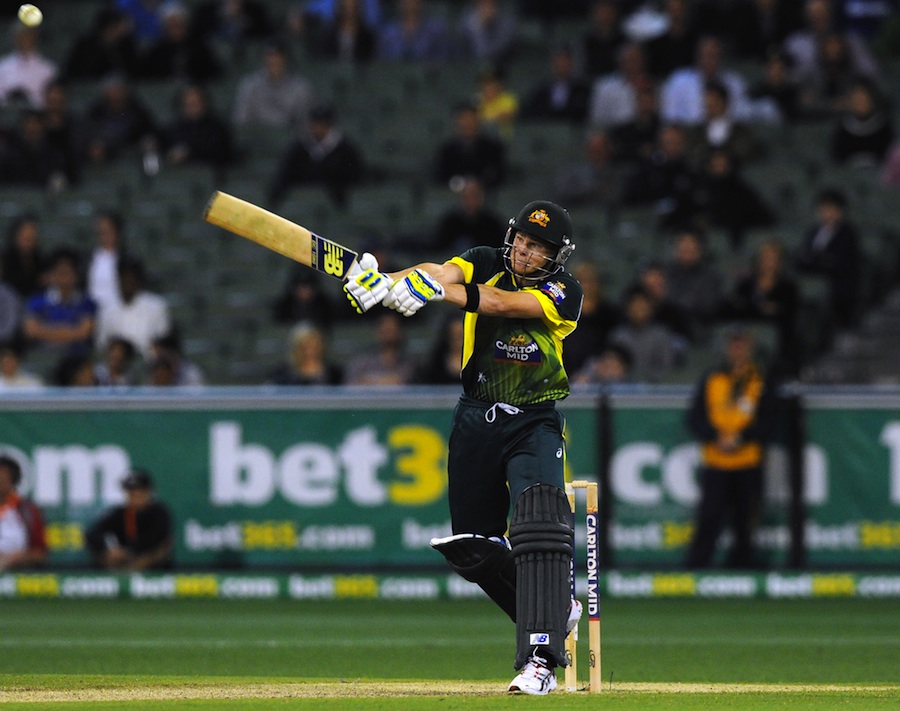Steven Smith started this series in form but out of the side. Matthew Wade started it out of form but in the side. Together, they set up a series victory by plotting one of Australia’s most remarkable one-day international chases, in front of one of the MCG’s most remarkably small international crowds. Smith’s 104 was reminiscent of Michael Bevan’s heroics at the SCG on New Year’s Day 1996, delivering victory from a position where defeat seemed inevitable.
Smith and Wade came together with Australia’s score at 5 for 98 in pursuit of 268. Effectively, they were 6 for 98, for Nathan Coulter-Nile’s hamstring injury meant he was unlikely to bat. But instead of panicking, the pair summed up the situation sensibly. There was plenty of time and nothing silly was required. Tick the score along at a run a ball, don’t get out, and blast it home at the end. Smith was skilled enough to make it happen.
Almost. With two runs required, he was bowled trying to slog sweep Robin Peterson, but there were still seven balls remaining, and the victory arrived with a single next ball from Pat Cummins when his shot to mid-on was picked up on the bounce by David Miller; the third umpire checked for a clean catch and found it had bounced. Australia had pulled off victory by three wickets with six balls to spare.
James Faulkner had played a key role after Wade fell for 52 late in the chase. Faulkner struck six boundaries in his unbeaten 34 from 19 balls and made sure the pressure did not build once the 121-run Smith-Wade partnership was broken. That occurred when Wade – who entered the series having scored only 101 runs at 16.83 in the recent Matador Cup – hooked a catch into the deep off Wayne Parnell.
He had struck four boundaries and one six, also off Parnell, and provided valuable assistance for Smith. After the previous game in Canberra, AB de Villiers described Smith as a nightmare for opposing captains. It was not a nightmare de Villiers could shake. Smith knocked the ball around and stayed at the crease, bringing up his 50 from 63 balls. He played a few of his adventurous Smith-style strokes, notably a tennis smash over mid-off for four off Kyle Abbott, but he took few real risks.
Smith scored his runs all around the wicket and his hundred came from 109 deliveries to show why he is viewed with such excitement as a likely future leader of this side. In front of 14,177 Melbourne spectators, Smith not only delivered a series win but also ensured he will be a permanent member of this ODI outfit after starting the series out of the side.
He came to the crease with early wickets having hurt. South Africa had drastically altered their attack from the previous game and the changes initially paid off. Abbott struck early by having David Warner lbw for 4 and his first spell was brilliantly miserly – four overs for five runs. Ryan McLaren, down on confidence after struggling in Perth, perked up after having Shane Watson caught behind flashing at a wide ball for 19.
Then came the big blow – Aaron Finch, who had made a century in that similar chase against England earlier this year, pulled a catch to deep square leg off Parnell for 22 off 37 balls. When captain George Bailey battled to rotate the strike and was caught behind trying to smash one outside off from Dale Steyn for 16 off 29, things looked grim for Australia. Another flash without footwork ended in Glenn Maxwell edging to slip off Steyn for 2.
Not until Smith settled in did Australia enter de Villiers-style batting mode. Having promoted himself to No.4, de Villiers milked runs and struck only six boundaries during the course of his 91 from 88 balls. Only once did he face three consecutive dots and by ensuring the pressure did not build, he allowed Miller to build an innings without feeling he had to go hard.
They combined for a 122-run stand that ended when Miller’s patience did in fact desert him, and during the batting Powerplay he tried to clear cover off Faulkner but was caught in the deep for 45. Faulkner, who was yet to play in the series, was one of Australia’s better bowlers and finished with 2 for 45 after he bowled Robin Peterson during the dying stages.
But the big wicket was that of de Villiers, who now has 271 runs in the series at 67.75 and seemed destined for his first hundred of the tour. However, he was caught slapping a slower ball from Cummins to deep midwicket with seven overs remaining, and the loss of their settled batsman seriously hurt South Africa’s momentum. Only 51 runs came from the final 10 overs for the loss of four wickets; their 8 for 267 should have been far more.
Still, it was something for their bowlers to defend after the top three batsmen all fell within the first 17 overs. Hashim Amla hooked Coulter-Nile to square leg and was brilliantly caught low to the ground by Cummins for 18; Quinton de Kock was caught and bowled by Maxwell off a leading edge for 17; and Faf du Plessis was caught behind off Cummins for 28, his first ODI wicket since June 2012.
All of Australia’s frontline bowlers made contributions – Mitchell Starc took 1 for 40 from 10 overs after claiming the late wicket of McLaren – and between them they ensured South Africa stuttered. Australia’s batsmen stuttered too, but Smith didn’t. He engineered Australia’s first ever ODI victory over South Africa at the MCG, which could be an important mental barrier overcome if they meet there for the World Cup final in March. For now, they ensured Sunday’s SCG match is a dead rubber.
(Taken from ESPNcricinfo, by Brydon Coverdale)


